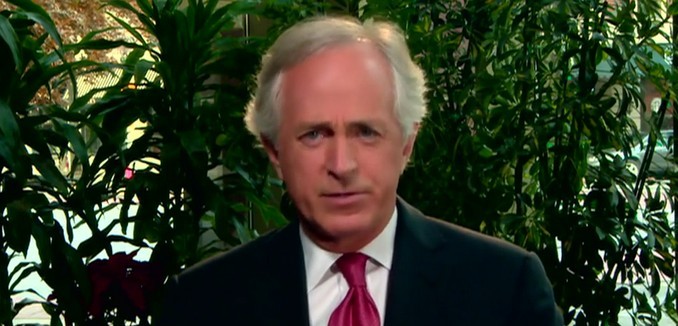A bipartisan bill requiring Congressional review of any nuclear deal agreed to with Iran was introduced in the Senate Friday. The lead senators on the bill are Bob Corker (R – Tenn.), Robert Menendez (D- N.J.), Lindsey Graham (R- S.C. ) and Tim Kaine (D-Va. ).
Josh Rogin in Bloomberg View reports:
According to the text, which I obtained, the “Iran Nuclear Agreement Review Act of 2015” would require President Barack Obama to submit any nuclear deal with Iran to Congress for a 60-day review period, during which the administration would have to wait on implementing most parts of the deal. During that time, Congress would have the opportunity to vote on the deal, although there is no explicit requirement that it do so.
The new bill was finalized after three weeks of intense negotiations between Senate Foreign Relations Committee chiefs Republican Bob Corker and Democrat Robert Menendez. Five other senators in each party have signed on, giving the bill’s authors what they feel is a good case for the legislation to move through the committee in March, to be ready to go to the Senate floor after March 24, if and only if Iran and the so-called P5+1 countries reach at least political agreement toward a comprehensive deal.
“Before sanctions begin to be unraveled, this gives us our rightful role to weigh in and keeps us involved as things move along — if a deal is reached,” Corker told me in an interview Friday.
The difference in the bill just introduced and previous versions is that this one would not require an up or down vote on the bill from Congress.
Rogin explains that, under this bill, if Congress would vote to reject the terms of a hypothetical nuclear deal with Iran, the administration would not be able to lift “any sanctions on Iran that originated from Congressional legislation.” Corker said that if no political deal is reached by the P5+1 nations and Iran by the end of March, then the Senate will vote on the Kirk-Menendez bill, which would strengthen diplomatic pressure on Iran if no final deal is reached by the end of summer. If, however, a political deal is agreed to by the end of March, the Senate will vote on the recently introduced bill to ensure that “Congress will have an opportunity to review the agreement and, more importantly, ensure its compliance after it goes into effect,” according to Menendez.
At the time the P5+1 nations signed the Joint Plan of Action with Iran, President Barack Obama stated that his administration “will continue to work closely with Congress” with respect to the nuclear negotiations with Iran. However, according to news reports late last year, the President was looking for ways to circumvent Congress in reaching a final deal with Iran. The administration’s reported interest in avoiding Congressional oversight in the course of its negotiations with Iran brought criticism from major newspapers.
In recent months, experts have advocated for and legislators have sought to assert greater Congressional oversight of the negotiations with Iran.




